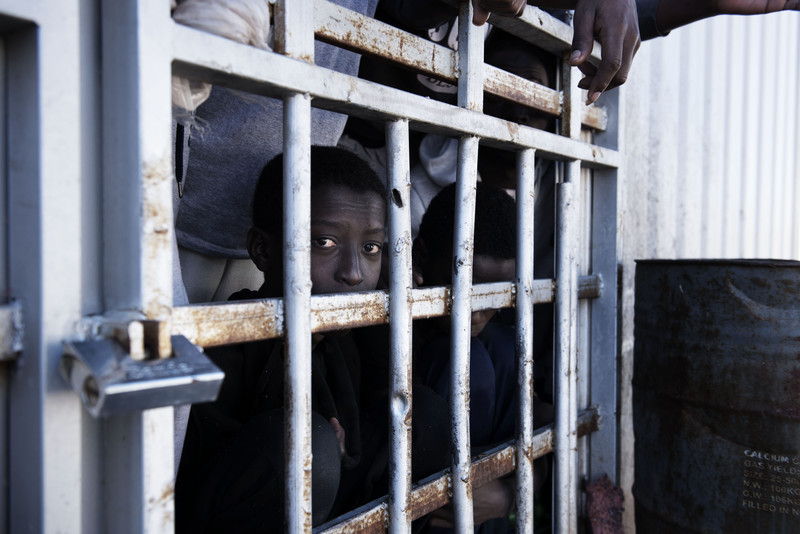UN criticises EU policy in Libya as 'inhuman'

Children face inhuman conditions in Libyan detention centres (Photo: © UNICEF/Romenzi)
The head of human rights at the United Nations has lashed out at the EU's
migration policy towards Libya.
In a statement on Tuesday (14 November), UN human rights chief Zeid Ra'ad
Al Hussein said forcing rescued people at sea to return to Libya for detention
was inhuman.
"The suffering of migrants detained in Libya is an outrage to the
conscience of humanity," he said.
The EU has helped broker deals with Libyan authorities as part of a
broader plan to prevent people from leaving the country.
It includes, among others, training the Libyan coast guard to take
migrants and refugees from the sea and then returning them to the war-torn
country.
Many but not all are then sent to detention centres, which are often
ruled by armed militia groups.
The EU's naval operation, Sophia, as of earlier this month has trained
some 142 Libyans.
A first training package included 93 Libyan trainees, which had spent 14
weeks on board the Italian ship San Giorgio and the first two weeks on board the
Dutch ship Rotterdam.
Another 20 senior officers at the rank of captain or commodore were
trained in Greece. Malta hosted 20 trainees and a module in Italy has been
started for another 66 personnel.
The Libyan coast guard has since intercepted almost 19,000 people since
the start of the year until October.
Those interceptions were supposed to take place within Libyan territorial
waters but charity rescue boats say the coast guard is also operating in
international waters.
German-based rescue ship Mission Lifeline said in late September the
Libyan coast guard fired shots, boarded it, and demanded they handed over the
people it had rescued at sea.
Libya's department of combating illegal migration (DCIM) says some 19,900
people are held in detention centres as of early November, up from around 7,000
in mid-September.
The spike is due in part to the thousands of people left stranded in the
smuggling hub city of Sabratha following fighting among rival Libyan militia
factions in October.
Both the EU-funded International Organisation for Migration (IOM) and the
UN refugee agency (UNHCR) at the time stepped in to help the migrants. Many were
sent to detention centres.
The same centres, which also house women and children, are ripe with
abuse, including rapes and murders.
"The international community cannot continue to turn a blind eye to the
unimaginable horrors endured by migrants in Libya," said Hussein.
He noted that efforts to improve the conditions in the detention centres
was not enough and that more needed to be done to ensure the protection of
migrant's human rights.
Similar comments were made earlier this year by the president of Doctors
without Borders (MSF), a medical NGO, Joanne Liu, who accused the EU of "feeding
a criminal system of abuse" by forcing migrants back to Libya.
The EU over the summer set aside some €46 million to boost Libya borders
and step up support for the Libyan border and coast guard.
The EU backed programme, implemented by the Italians, includes giving the
Libyans both training and equipment in terms of maritime surveillance and
rescues.
.jpeg)